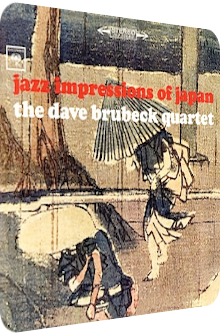
Dave Brubeck Quartet
Jazz Impressions
Of Japan
1964
Linking the music of Dave Brubeck to the Exotica genre is as farcical as hailing Martin Denny for his achievements in the realms of electronic music. But wait, I have my good reasons! Only very whimsically and infinitesimally could both gentlemen be tied to the respective fields of music, I have to admit; Martin Denny due to his Space-Age Moog synthesizer album for which he only gave away his name as he was not part of the production-related process, and pianist Dave Brubeck (1920–2012) because of his contemplations about the effects and incidents he and his bandmates encountered during their tour through Japan.
Jazz Impressions Of Japan is an eight-track album with seven unique cuts and one rendition of a TV series theme, released in 1964 on the Sony Music label and featuring the talents of the Dave Brubeck Quartet in a specifically intriguing way, at least for Exotica buffs who love to reside in the genre's jazzier alcoves. The quartet comprises Dave Brubeck on the piano, Paul Desmond on the alto saxophone, Eugene Wright on his double bass as well as Joe Morello on the drums, the latter of which are incidentally important markers for the album's Asian exoticism, thus being constituted of bongos and gongs amid the classic drum kit. Apart from the drums, the location of Japan does not manifest itself in the textures of the instruments but the composer's themes, segues and timbres only, if at all. T
wo tunes out of eight, however, are enormously exotic or tropical respectively, and these tracks alone are reasons enough to carefully explicate a possible, albeit fragile link to the realms of Exotica. Two additions nurture this humble endeavor further: firstly, the music that the quartet prepares, tries, according to the liner notes, "to convey these minute but lasting impressions, somewhat in the manner of classical haiku, wherein the poet expects the reader to feel the scene himself as an experience." This dreamy, languorous state is not uncommon in those Exotica works that stray away from the ever-threatening Easy Listening label. And secondly, the liner notes allege Paul Desmond's tenor sax to be especially meditative. I agree, he rarely uses the full energy his signature instrument is able to unleash and favors a deliberately diffuse, profound and acroamatic approach. I will take a closer Exotica-focused look onto Jazz Impressions Of Japan in the following paragraphs.
Tokyo Traffic is the gateway to The Dave Brubeck Quartet's impressions, launching in medias res, with all of its structures already intact, thus mimicking the very nature of its depicted phenomenon: nobody knows when the traffic started and in which phase its quasi-organic flowing scheme is currently in. Jumpy piano chords with inherited Far Eastern traces, the aqueous tick-tock droplets of Joe Morello's hollow bongos, reoccurring distant gongs with a long sustain phase and Eugene Wright's double bass undulations set the tone for Paul Desmond's alto sax melody which is rooted in more common – read: Occidental – Jazz realms and kicks off a new phase in the tune, neglecting all exotic and faraway slivers in favor of a concrete jungle setting. The mid-tempo bass and Dave Brubeck's effervescently tip-toeing piano placentas now resemble an intriguing stream, a kind of traffic that runs smoothly, with everyone involved on the street being happy and gleeful.
The feeling of Japan is never again resurrected in Tokyo Traffic which then ends astutely with a revved up drum prowess, gelid cymbals… and yes, one final gong for good measure. The following Rising Sun is the strict counterpart to the jam-packed opener, a quiescent downtempo piece of repose and modest solemnity. It is a reduced piano-and-sax arrangement which feels nonetheless dense, rich and complete. Brubeck's piano chords sound peaceful and illuminate the scenery with their golden color range. Desmond's alto sax is enormously mellow, silky and an equipollent part of the structure. No drums allowed, Rising Sun is all about a carefree yet concentrated gaze and a placid observation. A self-explanatory title which only tells half of its story. The rest has to be felt and experienced.
Toki's Theme is next, the one and only rendition of the album. Having been featured on the TV series Mr. Broadway, one expects the voluminosity and flurry of activity to increase, and sure enough, this is exactly what happens. Toki's Theme even hides exotic timbres in-between its bubbling piano shards, the dynamic saxophone sprinkles and the steam-evoking sizzles of the hi-hats and drums. Dark piano chords and heavily spiraling notes in higher regions mesh, and whenever the saxophone and the piano are in unison and play the same melody, the Japanese flavor grows and displays the archetypical pattern of duality which is so often found in the Americanized viewpoint on Asia. Toki's Theme is no tiki theme, but ebullient enough to leave a lasting impression. It may be out of place, given its status as the singular cover and its nature of a rapid frenzy, but it fits the overall theme, with the Asian traces being easier to pinpoint than before.
Fujiyama is next and returns to the soothing but crystal clear, attentive look that was already portrayed in Rising Sun. Here, however, the whole quartet is part of the arrangement. Launching with Paul Desmond's balmy yet threnodic alto sax tones and moving over to gong-underpinned susurrant piano runlets until mild double bass capsules finish the instrumental range, Fujiyama oscillates between yearning states, moments of understanding and sections of thankfulness in major. The only texture-related link to Japan: the aforementioned gongs.
Side B opens with a feast for Asian Exotica fans. The multi-faceted Zen Is When is the very reason I decided to write a review of this work. It is a lofty, lightweight yet meaningful composition. Dave Brubeck does not neglect the journey to quirkier, positively exhilarative locations. Bubbling bongos, gongs and gorgeously gleaming piano sparks which reside in the tonal range of Martin Denny as well as milky contrabass molecules coalesce and unleash the tropical euphony that lives up to the demands and dreams of Exotica fans. This piece is amicable, embracing and simply wonderful, and it proves to be a relief that it is composed by the mighty Dave Brubeck, so that no one can belittle this effort as Easy Listening! If Dave Brubeck fans accidentally came to this site because of this review and like Zen Is When at least one tiny bit, your taste is deemed compatible to the Exotica genre, I kid you not. It is the greatest piece off the album.
While the hybrid City Is Crying moves back to the illumination of the city in order to paint an aural panorama of rolling drums and similarly thunderous piano bolts which then lead to a saxophone-led Jazz locale with both staccato and glissando strata of the warmhearted kind, thus somehow lessening the portentous description of the title, it is Osaka Blues that revisits a quicker tempo, with vigorous saxophone sections and a shrapnel airflow of sunset-colored piano tones. The biggest achievement has to be the piano-related metamorphoses: from jumpy joy over plinking phases to thoughtful tonalities, Brubeck carries the whole composition with his signature instrument, making it hard to assess an overarching mood to the song. Ending with Joe Morello's skillful drum infusions, the finale is nigh; it is the second contender that allows me to link Jazz Impressions Of Japan to the Exotica genre, although the title, which happens to be Koto Song, promises more than the band can fulfill. Instead of featuring a real koto, Brubeck simulates the traditional instrument's surface and tonal range with his piano. The gorgeous sustain of the tones, the muffled bongos and other drums, the lachrymosity and yearning spread their Japanese rhizomes in adjacency to Paul Desmond's pondering saxophone sequences. Omnipresent gongs and looming bass accents round off this mysteriously opaque piece in the true spirit of Japanese conventions.
Jazz Impressions Of Japan neither targets the specific needs of the Exotica crowd nor is it particularly open to the semi-logical conclusions one could stack onto the arrangements in this regard. These rightful objections notwithstanding, it is glaringly obvious that The Dave Brubeck Quartet has been enchanted by the magic of this faraway country. These impressions then form the fertile soil of each track, the bandmembers try to mediate their Occidental play style with the physiognomy of Japan. It is therefore all the more interesting and downright exciting to spot those instances where the Far Eastern tonality shimmers through, especially so in the seemingly distant and camouflaged pieces, for instance in Tokyo Traffic which may give its location and topic away in its title, but then moves to harmonies that are more akin to Tallahassee than Tokyo. Or take Toki's Theme which only reaches an Asian state due to the simultaneous play of the melody on both the piano and saxophone. These tunes are luring on their own, but to be honest, they invoke no picturesque, let alone poeticizing motifs of Japan, not even Fujiyama can be linked that easily due to its disregard of all too obvious chords.
Enter Zen Is When and Koto Song, two marvelous gems, the first one a blithesome and vivaciously frolicking Dennyism, the second one bar any stringed instrument but full of enigmatic shades and koto-emulating piano cascades instead. The album is really about the impressions, not Japan or Asia itself, and thus tends more towards the West than the East. But it is a captivating work, one which, however, would have greatly benefitted from a guest musician or a vocalist and at least one Japanese instrument like the koto, shamisen or the shakuhachi flute. In the right doses, these additions would not have been gimmicky at all. They would have enhanced the listening experience and figuratively carved out the Jazz Impressions Of Japan. The album is available on vinyl and a remastered CD which also serves as the base for the digital download version.
Exotica Review 206: Dave Brubeck Quartet – Jazz Impressions Of Japan (1964). Originally published on Apr. 20, 2013 at AmbientExotica.com.
